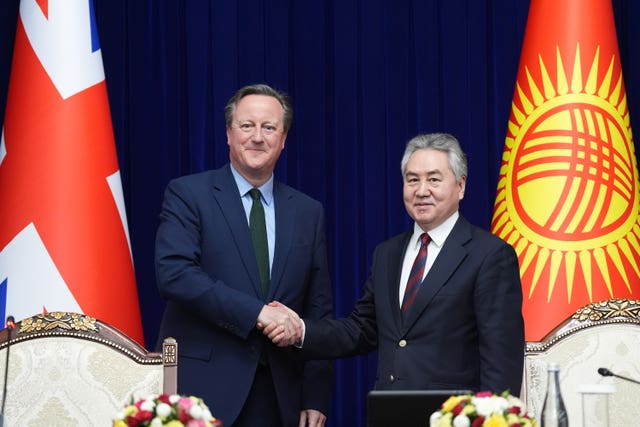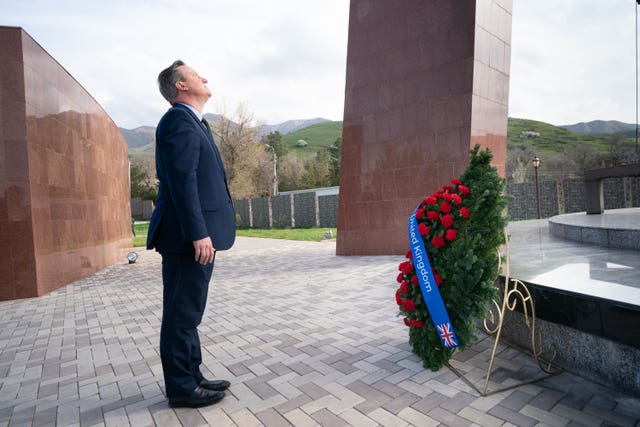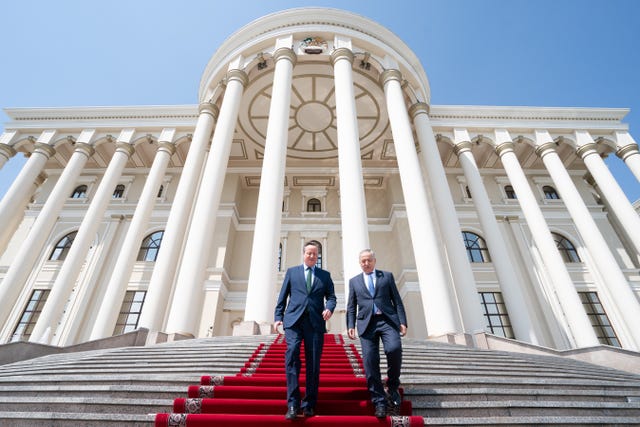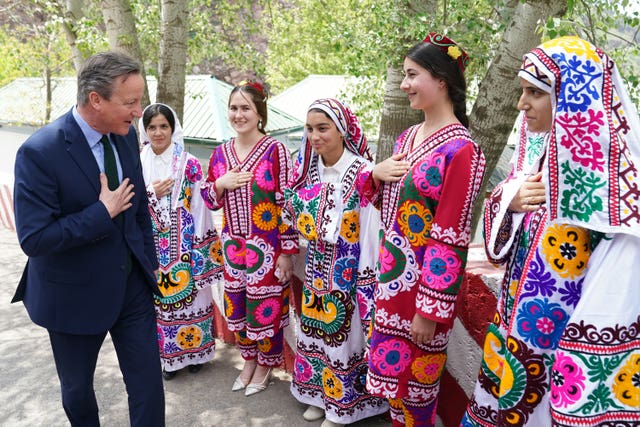Cameron: Russia using Central Asia to side-step sanctions
It comes amid concerns about a spike in sales of drone equipment and heavy machinery from Britain to countries such as Kyrgyzstan and Uzbekistan.

Lord David Cameron has acknowledged that Russia is using Central Asia to side-step sanctions and said Britain wants to work with countries in the region to end the circumvention.
The Foreign Secretary warned that items which could be used to build Russian President Vladimir Putin’s war machine should not be being exported from the UK to neighbouring states only to be sent on to Moscow.
It comes amid concerns about a spike in sales of drone equipment and heavy machinery from Britain to countries such as Kyrgyzstan and Uzbekistan.
Speaking on a visit to the Ata-Beyit memorial to victims of Soviet repression near Bishkek, Kyrgyzstan’s capital, Lord Cameron suggested Britain can talk to Central Asian countries about the so-called “common high-priority list” of western items critical to Russian weapons systems.

The Foreign Secretary is travelling across Tajikistan, Kyrgyzstan, Uzbekistan, Turkmenistan, Kazakhstan and Mongolia in a diplomatic bid to boost trade, security and environmental ties with the UK.
In talks with leaders from across the region, Lord Cameron will seek to “advance discussions on sanctions circumvention, human rights and reform”, the Foreign Office said.
British exports to Kyrgyzstan have risen by more than 1,100% since the Kremlin was hit by sanctions following the 2022 invasion of Ukraine, according to Sky News.

Lord Cameron famously hailed a “golden era” in UK-China relations while prime minister, which have since deteriorated as Beijing grows increasingly assertive on the global stage.
His engagement with Central Asia signals a bid to limit the scope of powers in the east and encourage countries in the region to look west instead for partnerships.
“This is a more dangerous, more difficult, more disputed, more competitive world,” he said.
“There are things we must do to strengthen our defences … our protections against interference, but also we strengthen our alliances – hold friends close and build new alliances as I’m doing here.”
In a meeting with Tajik President Emomali Rahmon at the Palace of the Nation in Dushanbe on Monday, Lord Cameron said there was “more we can do” to co-operate on key areas such as business, climate change and counter-terrorism.

“We want to signal a new era in relations between Britain and all of the Central Asia republics, starting here in Tajikistan.
“Overall, we’re here to say let’s make the partnership bigger, let’s do more things together.”
During the trip, Lord Cameron announced a doubling in the amount of funding for Chevening scholarships, which support people overseas studying in British universities, and £50 million of funding over the next three years in development spending across the region.
A new scheme designed to promote the English language will also be announced, including online teaching resources with tailored local content available to teachers throughout Central Asia, the Foreign Office said.
On Monday, the Foreign Secretary visited a number of key sites including the hydro-electric project at the Nurek Dam in Tajikistan, which is heavily reliant on Russia for fuel, and promised UK financial backing for green energy initiatives.

“(You are) at the sharp end of climate change with the melting of the glaciers and the problems that you face here. But you’re also a big part of the solution by providing that clean, green energy,” he said.
Following bilateral meetings with Kyrgyz President Sadyr Japarov and foreign minister Jeenbek Kulubayev, he said he believed the trip was “the start of something very serious”.
Lord Cameron was also asked by independent local journalists whether he raised the issue of press freedom and civics in his talks with the leader amid concerns of a crackdown on civil society groups and non-state media in the region.
He told Radio Free Europe/Radio Liberty they discussed “all of the issues you’d expect us to” including “the importance of voluntary bodies, charities, non-governmental organisations, civil society organisations – they’re part of our countries, part of our democracies.”
“Of course we should always respect each others’ differences and each others’ approaches, but in my view civil society organisations, they play a role in helping democracies work better,” the Foreign Secretary added.
The Foreign Secretary said: “We live in a contested, competitive world. If you want to protect and promote British interests you need to get out there and compete.
“Central Asia is at the epicentre of some of the biggest challenges we face and it’s vital for the UK and the region that we drive forward its future prosperity.”





